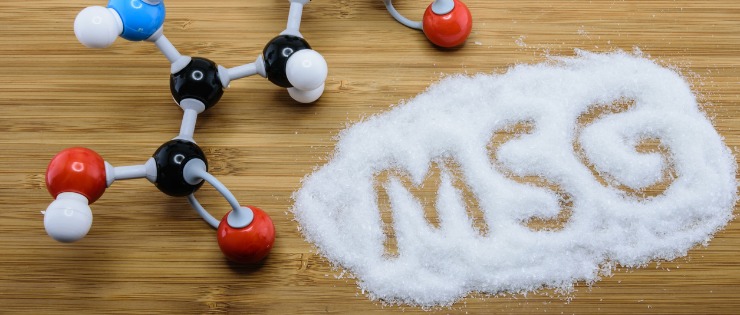
Few food additives are as controversial as MSG (also known as flavour enhancer 621). Some people have called for it to be banned, while others have declared it completely safe. According to experts, the number of people who suffer adverse side effects from eating MSG is tiny, and their symptoms are mostly mild and short-lived.
What Is Flavour Enhancer 621?
Classified as a food additive by the Food Standards Australia New Zealand (FSANZ), when MSG is added to processed foods it appears in the ingredient list as food additive number 621. MSG is also referred to as “flavour enhancer 621”.
Other glutamates that are added to foods include Monopotassium L-glutamate (622), Calcium glutamate (623), Monoammonium L-glutamate (624) and Magnesium glutamate (625).
Food manufacturers use MSG 621 to reduce the sodium content of foods because it’s lower in sodium than table salt.
What is Monosodium Glutamate (MSG)?
MSG is the sodium salt of glutamic acid (glutamate), a non-essential amino acid. MSG is commercially produced by fermenting molasses from sugar beet, sugar cane or wheat. It has no smell or flavour itself but it brings out the savoury or meaty taste of processed foods. The flavour of food with MSG (both added and naturally occurring) is described as ‘umami’ which is the fifth basic taste after sweet, sour, bitter and salty. Umami comes from the Japanese word ‘umai’ which means delicious.
History of MSG
A Japanese professor and chemist, Kikunae Ikeda, developed monosodium glutamate in 1908. Ikeda had been eating a bowl of seaweed soup his wife had prepared and wondered why he could taste something meaty when there was no meat and wanted to isolate the flavour. Ikeda was trying to discover how seaweed, which had been used by chefs for centuries, enhanced the taste of foods. Today, people consume more than 1.5 milion tonnes of MSG each year.
MSG became popular in America during World War 2 when soldiers’ flavourless rations were pepped up with a sprinkling of MSG. After the war, industrialisation of food production began, and MSG was added to everything from canned food to frozen meals.
Naturally Occurring Glutamate
Glutamate is naturally occurring in some protein foods such as meat, fish poultry and vegetables. MSG has a sodium atom missing from glutamate which makes it into a salt form that can be added to food. MSG can be added to processed foods in the form of hydrolysed vegetable protein, yeast extracts or flavours. Free glutamates are found in tomatoes, cheese, mushrooms and tomato paste. It is estimated that we ingest 20-40 times more naturally occurring glutamate than MSG.
The human body produces glutamate naturally when we digest food. Glutamate is a neurotransmitter in the brain which plays a crucial role in memory and learning.

Health Effects of Flavour Enhancer 621 (MSG)
Few topics are as controversial as the health effects some people claim to suffer after consuming MSG. Some people claim MSG is poisonous while others have never experienced any adverse reactions to the flavour enhancer.
Is MSG Bad for Your Health?
There has been some controversy in recent years about whether MSG is entirely safe for human consumption. For people who are intolerant to MSG, they would argue that MSG is bad for everyone and should be avoided at all costs.
MSG has been studied for more than 30 years in Australian and overseas researching what the effects of MSG are on the body. Food Standards Australia New Zealand (FSANZ) has ruled it safe for consumption at the current levels. The US Food and Drug (FDA) and World Health Organisation (WHO) also agree that MSG is safe to add to foods. No country has banned the use of MSG in foods consumed by adults however 50 countries have banned its use in baby food.
Does MSG Have Side Effects?
FSANZ reports the prevalence of Chinese Restaurant Syndrome (CRS) and other MSG side effects to be between 1 to 2% of the population.
Chinese Restaurant Syndrome
The New England Journal of Medicine in the late 1960s published claims about the Chinese Restaurant Syndrome. The author of the letter, a Chinese-American doctor from Maryland, reported that he had experienced symptoms of neck numbness, weakness and palpitations after eating foods containing MSG. Letters from readers soon followed, claiming a wide range of side effects. Since then, other more common symptoms have been added to the syndrome including headaches, migraines, numbness/tingling, chest tightening, heart arrhythmia, anxiety, irritability, irritable bowel syndrome, restlessness, sleep disturbance, flushing, muscle tightness and behaviour problems in children.
Claims about the syndrome have never been substantiated according to Dr Philip Ashurst, an independent food science consultant and author of the book Food Flavourings.
However, a 2012 study in Chennai of Chinese restaurant syndrome among 131 medical students showed almost 23% of participants suffering adverse effects of MSG. Symptoms were recorded within 2-3 hours of eating MSG and included gastritis and bloating amongst 28%, sweating 16%, dyspepsia 14% while 11% experienced a light head, nausea, diarrhoea or a headache. The symptoms were not persistent and disappeared without treatment within 2 hours.
Bronchoconstriction
In the early 1980s, a link was made between MSG and the triggering of bronchospasm and bronchoconstriction in a small number of asthmatics. Food Standards Australia believes the current evidence available doesn’t indicate MSG is a significant trigger.
Obesity
An animal study by the University of North Carolina showed people who use MSG as a flavour enhancer are more likely to be overweight or obese than people who have the same calorie intake and physical activity but don’t use MSG. Adding MSG to home cooking is common in China, but Western diets are high in MSG due to the volume of processed foods consumed.
Intolerance to MSG & Glutamates
Many people claim they have a sensitivity or intolerance to MSG, but there is no clinical evidence to support food intolerances to MSG. People can reduce their intake of MSG by checking for 621 on the ingredient list of processed foods.
Avoiding foods high in naturally occurring or free glutamates is a little more difficult, but everyday foods include:
- Matured cured cheeses and meats
- Fish sauce
- Soy sauce
- Tomatoes
- Broccoli
- Peas
- Walnuts
- Mushrooms

Research into MSG
Research has been conducted on the health effects of MSG for over 30 years, but much of the early results have been discounted due to flawed methodologies.
Only two major studies in the world have been completed that are considered valid. The Joint FAO/WHO Expert Committee on Food Additives (JECFA) evaluated MSG in 1987, and the Federation of American Societies for Experimental Biology (FASEB) completed a review in 1995.
Both reviews came to the conclusion that MSG doesn’t represent a health hazard for the general population. The FASEB review reported there was sufficient evidence to show some individuals may experience CRS symptoms when exposed to >3g bolus dose of MSG without food. A small number of asthmatics responded to lower doses. The JECFA trials couldn’t find a definite link between CRS and MSG.
The European Food Safety Authority (EFSA) completed a report in 2017 to establish a safe intake level of glutamic acid and glutamates as food additives. Food enhancers E620-625 are authorised food additives in the European Union, but EFSA has re-assessed their safety and derived an acceptable daily intake of 30 mg/kg body weight for all of these additives. The safe level was decided on after scientists observed no adverse effects on test animals. Previously there was no numerical safe intake level for glutamic acid and glutamates being used as food additives in the EU. FSANZ noted it was aware of the EU development and the opinion didn’t raise new safety issues not previously considered by the FSANZ assessment.
Common Foods Containing Flavour Enhancers
Following are foods that commonly have flavour enhancer 621 added during manufacture.
- Snack food – potato chips, savoury biscuits
- Chinese restaurant food
- Stock
- Soups
- Sauces
- Seasonings
Data from the UK suggests the average intake of MSG is 590mg per day, but a highly seasoned Chinese restaurant meal could see the daily intake as high as 5000mg.

How to Avoid MSG Flavour Enhancers
If you choose to avoid eating MSG, read the ingredient list of processed foods. If the food additive 621 is listed, MSG has been used in preparing the food.
When eating out or ordering at Chinese restaurants, you can ask that the chef not add any extra MSG while cooking your food. However, many chefs use MSG in the preparation of the food well before cooking so it may not be possible to avoid MSG in all dishes. If you are intolerant to MSG, you may need to choose a different takeaway meal option.
Labelling Foods ‘No Added MSG’
Some manufacturers and retailers are promoting their foods as additive free and no added MSG on the packaging. Parents of young children, in particular, have looked for processed foods with as few artificial colours and flavours due to a possible link with behaviour problems and food intolerances. Even though it is approved as safe by FSANZ, some shoppers are favouring those brands that don’t use MSG.
The Canadian government health department has said that the labelling of foods as MSG-free is often misleading because MSG is added in other forms such as hydrolysed vegetable protein (HVP), hydrolyzed plant protein (HPP), hydrolyzed soy protein (HSP), soya sauce or autolysed yeast extracts. Foods with high amounts of naturally occurring glutamate such as tomatoes and cheese may be added instead of the MSG.
Food Additives
Many people are turning against eating foods containing additives, preferring to feed their family foods that are additive free.
So unless you intend to eat vast quantities of MSG on an empty stomach, research shows you shouldn’t have any side effects. If you are one of the unlucky few that does suffer an ill effect, the symptoms will be mild and short-lived. If you have any concerns about MSG, check out the ingredient list of processed foods.